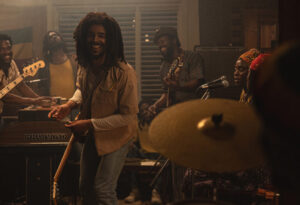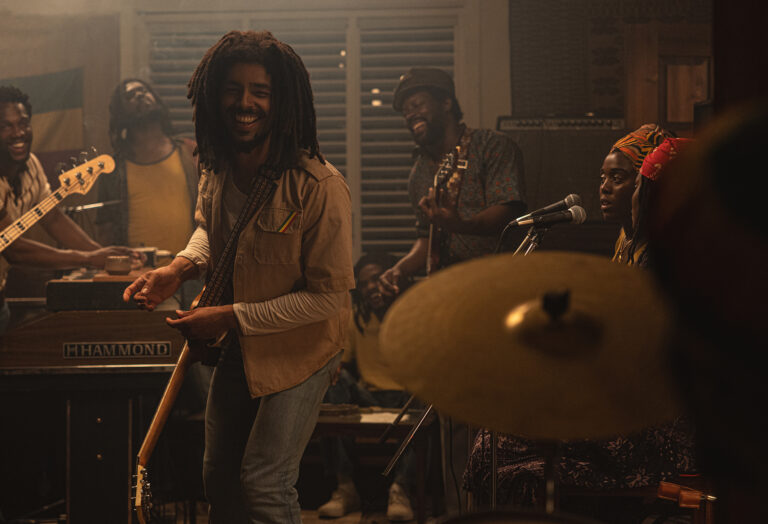Movie Info
Movie Info
- Director
- Reinaldo Marcus Green
- Run Time
- 1 hour and 47 minutes
- Rating
- PG-13
VP Content Ratings
- Violence
- 3/10
- Language
- 1/10
- Sex & Nudity
- 1/10
- Star Rating

Bob Marley is no doubt the most famous person of the 20th Century to come out of Jamaca, and yet if you are like me, you know him only by a few reggae songs heard over the radio. Director Reinaldo Marcus Green’s film focuses upon a couple of years of the singer/composer’s life, with flashbacks to the teenage years of him and the girl Rita who would become his wife.
The film begins in 1976 with a press conference just before his Kingston concert at which he hopes to put an end to the chaotic violence among the two political parties and the gangs. The fear is that now that the British have given up their colony, the nation is about to break out into a civil war. When asked what party he favors, he says “None,” but apparently some do not believe him because during his and the Wailer’s preparation for the concert a pair of thugs break into his compound and shoot Rita (Lashana Lynch), his agent, and himself. Marley is not wounded seriously, but his wife requires hospitalization.
This does not deter Marley from going on with his concert, but he does decide to take his family and move to London for the sake of safety. There he produces the album that brought him world-wide acclaim, “Exodus.” Rita leaves for a time for America with their children to live with his mother Cedella in Delaware, and Marley and the Wailers go on tour. There are flashbacks to his youth where he feels abandoned by the white father who took no interest in him and then to his teenage years when he fell in love with Rita, both of them suffering from their schoolmates regarding them as outsiders—he because he was considered too “light-skinned,” and Reta too “dark-skinned.” Their subsequent marriage is a troubled one because of his many infidelities—he sired eleven children with other women. No wonder Rita is angry at times and suspicious of female groupies that hang outside hi concert venues.
The film is very sketchy throughout. We learn just a little about Marley’s Rastafarianism and its connection with Markus Garvey and Emperor Halle Selassie of Ethiopia. A Rastafarian elder tells them that they do not worship white gods, stating that “Our God is black.” Marley himself is so highly regarded that what Jesus said about John the Baptist might also be said of him. He did not believe in music just for the sake of music. His songs were rooted in the ups and downs of himself and his people. Like many American singer/songwriters of his time, he protested in justice. He believed in the power of music to change people’s hearts, as witness the famous One Love Peace Concert in which he brought together two opposing leaders.
The film’s sketchiness becomes disappointing when what should be the film’s climax, the One Love Peace Concert in April 1978 in which Marley invited the Jamaican PM Michael Manley and his bitter rival Edward Seaga up onto the stage to join hands, is not staged, but just shown in an archival clip. Shown with a restaged clip of his singing, this could have had a powerful impact on viewers!
Also sketchy is the sequence about his use of marijuana and his neglect of his health and the discovery of the skin cancer that killed him at the youthful age of 36. We do see him using marijuana, but I learned of his espousal of it only from reading about him.
The film is enjoyable, with actors Kingsley Ben-Adir and Lashana Lynch ably portraying the husband and wife, but they are hampered by a script that appears to have had too many writers to have made a coherent film worth of the man. I intend to take the advice of the critics who recommend the documentary Marley.
This review is in the March issue of VP along with a set of questions for reflection and/or discussion. If you have found reviews on this site helpful, please consider purchasing a subscription or individual issue in The Store.
Paramount Pictures

